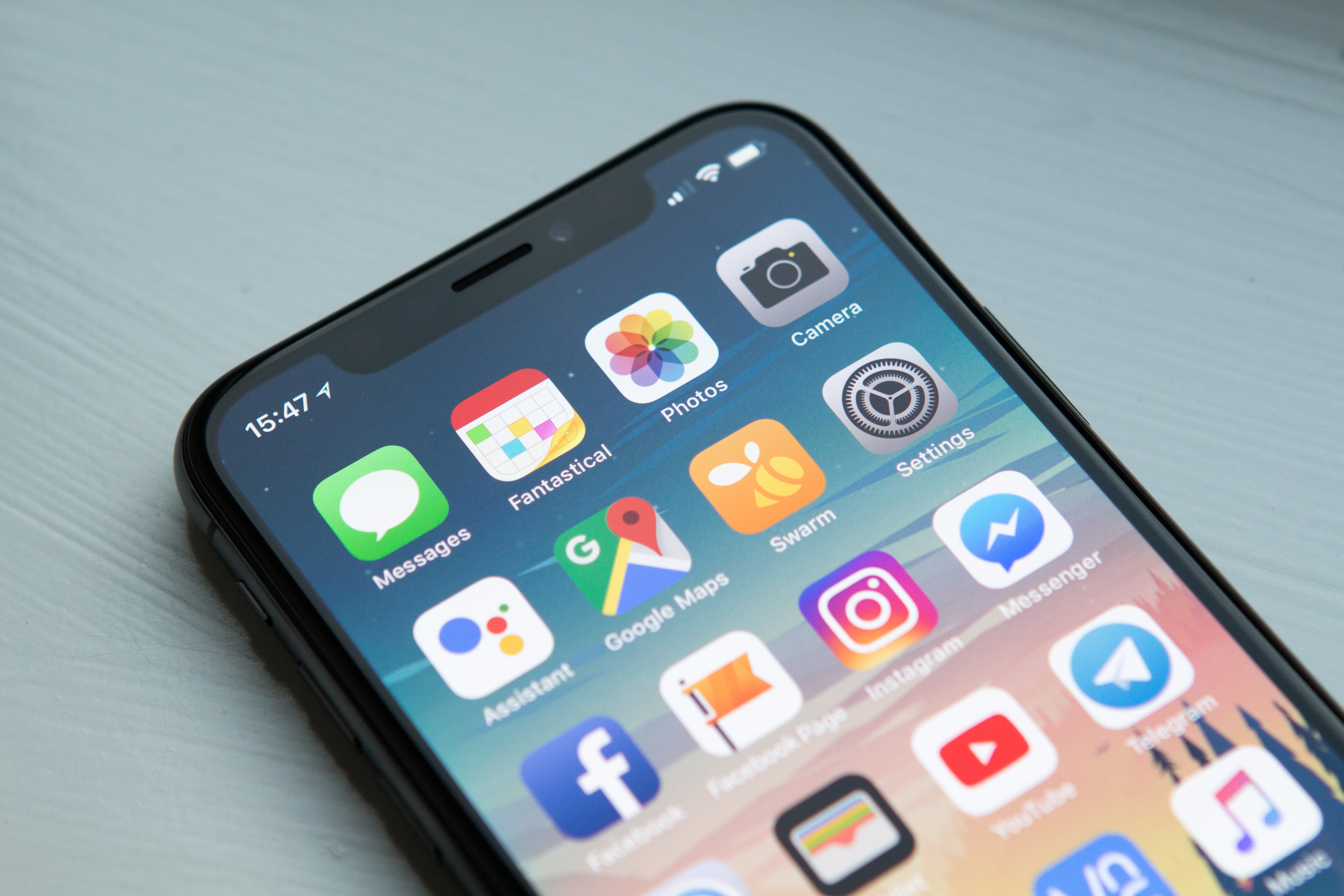
In 2019, using mobile devices has become an essential part of daily life. The rise of technology alongside mobile device variety has alternated the way we function on a daily basis. This is a train that has left the station and has forever changed the way we view technology, communication, and business. Let’s dive into a couple of statistics. For instance, in 2018, the number of mobile-only internet users in the US was 44.5 million.
This means that websites accessed through mobile devices have increased by over 50% in the last 10 years. In 2009, it was only 0.7%, but in 2018 it went up to 52.2%! More and more users are accessing information or buying goods using their mobile phones, whether be it through a mobile website or mobile apps.

Global Mobile Phone Website Traffic Share
As of the second quarter of 2018, it was found that the average adult in the US spent 142 minutes (2.37 hours) per day online via a smartphone browser or app. Source.

Global Mobile Data Traffic Forecast
With that, In 2018 mobile app downloads reached 205.4 billion worldwide. This figure alone should tell you how popular mobile apps are becoming with no stop in sight anytime soon. We probably don’t have to mention that having a digital presence is important for your business. With that, having a mobile-friendly digital presence is crucial to ensure the business keeps flowing. The key question, however, is whether you should go for a native mobile app or a responsive mobile website. Here we will discuss the benefits and drawbacks of both options. Let’s begin!
Mobile Website
A mobile or responsive website is just like a desktop website but specifically designed for small devices. It has much of the same components as a desktop website from a home page to contact form. However, there are key differences between the two. A mobile responsive website is intended to appear seamlessly across all digital devices ranging from laptops to cellphones.
Average adult in the US spent 142 minutes (2.37 hours) per day online via a smartphone browser or app
This then is the crucial aspect; ensuring that your mobile website is responsive across all devices. Having a responsive mobile website is vital for every business. Even if your business model is predominantly mobile app focused, you may want to consider a responsive website that gives users information about the app itself.
Now, let’s dive into the reasons to consider a mobile website over an app:
1. Easy Access For All Users
Mobile websites are very easily accessible, all you have to do is type in the URL. Easy accessibility makes it reachable to a broader audience. With a mobile website, visitors can access your website through any mobile device, allowing more traffic and flow to your digital website. Unlike mobile apps which may favor particular software, you don’t have to worry about OS alongside a slew of other technical issues and concerns that arise when developing and maintaining an app.
2. You Are On A Budget
Having a responsive mobile website is a cost-effective solution compared to a mobile app. Due to the extensive work that a mobile app requires, a website only needs to be responsive and designed for multiple browsers and mobile services to be able to function properly. With this, you can stay on budget. Many individuals opt-in for custom mobile responsive websites, which are still below the average cost for an app.
3. Not Frequently Used
A mobile-friendly online website is worth considering if you do not receive many visits per month. With that, an app is for individuals that have a constant stream of digital business or users. However, if you have a portfolio based business or a resume based business that only brings in a certain amount of traffic per month, a mobile-friendly website is the best choice.

Man holding an iphone looking at a mobile optimization screen | Photo Credit: Neonbrand
4. Search engine optimization (SEO)
You have already heard of SEO before. However, how vital is it for a digital website? If you want to have a strong online presence, there is no alternative than SEO. Having an optimized mobile website will help you in achieving a high rank in search engine results which results in more traffic and business to your website. For instance, Google has made mobile responsiveness one of the SEO factors crucial to proper search engine optimization. If you want to be the #1 spot in your business, or even on the front page of any search engine, mobile responsiveness is crucial. If you are unfamiliar with SEO, you can contact an agency such as Black Flag Creative to assist with SEO.
With that, even if your entire business is dependant on an app, as we said before, you’re probably going to have a mobile website simply to ensure a strategic web presence. In this highly competitive market, SEO has become a necessity.
5. Maintenance
Without a doubt, a digital website requires much less maintenance than a web app. If you are seeking minimal upkeep, then a mobile website is the way to go. Unlike mobile apps, you don’t have to worry about bug fixes, pushing updates to App Store, etc. In short, you do not have to keep monitoring performance constantly, which often requires a maintenance team. Popular and user-friendly CMS (content management systems) like WordPress or Weebly make it easy for you to update content without taking help from an expert.
Mobile Apps
Mobile apps are quite different than a mobile website due to the design, the process, and the end result. To start, a mobile app is developed to work on a specific platform like iOS or Android. Secondly, a mobile app requires specific coding alongside installation methods to ensure they are available for specific devices.
With that, a mobile app tends to have a more specific purpose compared to a mobile website. Mobile websites are predominantly information and service focused, while mobile apps are designed for specific goals.
In 2018 mobile app downloads reached 205.4 billion worldwide.
For instance, a mobile app itself can be a product of your business, such as a real estate app dedicated to finding homes or a social media app such as Instagram. Let’s keep in mind that many apps are first developed, designed, and then sold for millions of dollars, which can be a part of your business as well, such as app investing.
Here are some reasons it might make sense to have a native app.
1. Requires Frequent Use
Any service that requires frequent use is a better candidate for a mobile app. What do we mean by that? Well, there are apps that you probably use frequently, like almost every day or every hour. For example, messenger apps or music apps. Users are often willing to install these types of apps on their devices. So, if you are in the service industry offering an everyday need or service, an app may be the way to go!
2. Requires Customization
If you want to offer a user-focused experience, then an app is worth considering. For instance, if your app is designed as an everyday service such as social media or Google maps, this is worth considering. Apps can behave in a certain way based on location, interest, etc. For example, an app like Google maps functions differently based on location. It also functions based on the user’s preferred settings such as notifications, location, etc. In other words, an app allows for a more personal experience between the application and the user.
3. Use of Device Hardware Features
If your app requires the use of an accelerometer, gyro, proximity, compass, barometer, etc. then an app is the way to go. You can take advantage of all the hardware in your device by developing a native app. This because apps use specific parameters to be able to function within the mobile device, such as a tablet or cellphone.
Therefore, the coding of the app can function in accordance to specific properties or setting of your device. Let us give you an example: a lot of health-related apps use an accelerometer to detect your activities like steps you have taken or stairs you’ve climbed. Alongside this, photo editing apps work in tangent with your camera and your gallery to be able to save and access photos and information.

Picture of an iPhone on the menu screen, looking at different business apps | Photo Credit: Rahul Chakraborty
4. Push Notifications
If your service can benefit from push notifications, then a mobile app is the way to go. This is a great feature that you can use with your mobile app due to the simplistic nature and interactive benefits. For example, sports update apps use push notifications to let you know when your favorite team scores a goal. Alongside this, gaming apps use push notifications for when a new level or downloadable content is available. However, the biggest benefit is that push notifications can work as a marketing tool, which can only enhance your business. A perfect example is Amazon, or any shopping app. Shopping apps will send your push notifications when a discount or promotion is available.
5. Offline Access
A mobile app is an excellent digital addition to any business if the business wants to require offline access. If your mobile app can function without the internet, then that is more of a benefit for the user. A user might not always have access to the internet, but with offline access, they are still able to use the app. How does it function? Well, since a native app is installed on the device, it is able to function without the internet if the internet is not needed. For example, apps like Simplenote or Books can be used offline. You can download books and read them anywhere without using the internet. However, this is only beneficial for specific services or businesses and the app will always require internet access if it needs an update.

Picture of an individual reading a book using a mobile application on their iPhone | Photo Credit: Savanna Mitchell
There are few other instances where you might consider a mobile app over a mobile website. Sometimes the bad design of a responsive website can create a bad experience for users, which can affect the traffic of your website and the business it is bringing in. In some cases, the content or design that you are trying to offer may not be supported on a mobile device. A native app can solve such issues easily. Let’s take a look at the image below as an example of one such situation:

Example of mobile website fails
For more, you can visit WTF Mobile Web.
Contact Los Angeles Mobile App Development Company, Black Flag Creative Crew Today!
To quickly summarize,

It is important to keep in mind which of these mobile efforts is best for you. Maybe it’s one or both. However, it is crucial to conduct proper research and talk to a mobile development agency to help you with your decision!


